What I Believe – Seniors in a Food Pantry
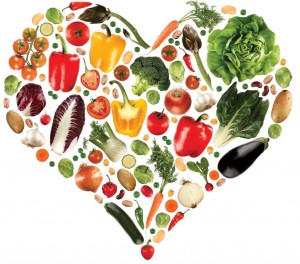
As seniors age, the courage we experience becomes more obvious as we feed hungry people. After all, what does a senior have to lose? Courage is a necessary part of the aging personality because our platform continually shrinks.
We’re often overlooked in the homeless arena. Those looking out forhomeless people focus on an older adolescent (especially if there’s an infant involved), and families. There’s just not much energy left over for hungry people seniors and cocker spaniels.
It never occurred to me that turning away hungry people in the pantry line was something I would do. Or could do. Or even consider doing. Turning away hungry people was not an option.
I came to the pantry as a crone or harridan depending on the circumstances and a person’s attitude toward me and my attitude toward hunger. I brought already formed opinions and beliefs, many of which were with me at birth.
Some argue that people are born as blank slates. I can’t agree. For one thing, I never experienced a blank slate when it came to hungry people. I didn’t have an “aha” moment when I met my first hungry person. I didn’t examine the value of feeding hungry people in a philosophy or government class. I never, at any time, analyzed the concept of feeding the hungry.
Because I lived my opinions about hunger, and because I got up close and personal with hungry people in Mexico and Venezuela, I was comfortable with the concept of feeding hungry people.
I never even considered not feeding hungry people I the food pantry. When I saw them, I remembered moments in Mexico and Venezuela and realized hunger is an intensely personal situation accompanying malnourishment. Hunger can lead to starvation.
Hungry people needing food are voiceless. Even though it’s harder on those with mental and emotional issues, it impacts everyone spiritually.
As they distribute pantry food, volunteers reduce costs in other areas of government: healthcare, housing, education.
A long-term poor diet contributes to illness which poor people can’t afford. Healthcare costs get shuffled over to taxpayers. When forced to choose between housing and food, the hungry often opt for housing. Later, if they can’t pay the housing costs and end up homeless. This results in further tax bills.
When school children are too hungry to learn, the damage is long term. They risk becoming uneducated adults unable to qualify for employment. Our problems flow to the next generation and the future.
DANA
“Hi, Dana. Come on in and shop. How’re you doing this week?”
“Fred’s still in the hospital. He’s been diagnosed with kidney disease and he’ll be on a special diet when he comes home.”
“I’m sorry to hear that.”
“I’m so glad you sent me to Dr. Longmore. He told me exactly who to go see, what paperwork to get, everything I needed to get care for him. I hope Fred’s coming home soon.”
“Dana, I’m so happy to hear this.”
“Thank God the pantry has all these fresh fruits and vegetables. By the way, do you have any laundry soap today?”
“I wish!”
I met Dana the first morning I worked in the pantry and she shared her adventures with me every week from that pantry day on. Of all the people going through the line in the pantry, I probably learned more about her than anyone else.
I never learned where she lived, how many children she had, where she came from or anything like that. What I learned from her was a running commentary of present tense food insecurity. She shared her daily struggle as she traveled through life trying to keep a roof over her head, clothes on her back, and food in her refrigerator.
Walking through the line weekly, she shared her life with me. I learned how she found a coat for the winter when the old one wore out and she had no money.
“Dana, your coat is beautiful!” It’s going to keep you so warm!”
“Yes, it is, isn’t it? You should have seen it when I found it. It was filthy!” I couldn’t even tell what color it was. I took it home, put it in the tub and worked on it all afternoon ’til I cleaned it up. Now look at it. It’s a perfect fit!”
I learned how she struggled to keep her car going…and then finally gave it up.
“The bus is working out real well over here. I catch it about two blocks from my apartment in Saugerties and ride it over. I wait in the hall ’til it comes back to take me home. I only have to carry my groceries about five blocks in all! I’m so lucky I found this bus. I get to ride free because I’m a senior!”
Dana was the most confirmed optimist shopper in the line. And, when Dana was in the line, I was the most confirmed optimist pantry volunteer in the place.

Thank you for reading this article! Please refer it to your preferred social media network.
Thurman Greco
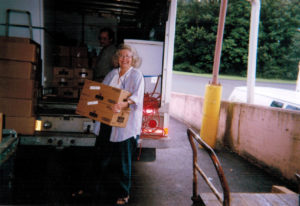

Abundance 1: What Does it Mean to be Hungry?
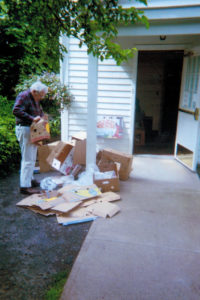
Abundance. What does it mean to be hungry?
For starters, it means you don’t have the money to buy the food you need for the next meal.
For one other thing, it means getting put in a category, or two, or even thirty. And, getting labeled. When the economic downturn began around 2007, new categories and labels appeared weekly, daily even. Journalists, politicians, social workers, sociologists, writers, created new categories as they related stories about hungry and homeless people. Stories about hungry people appeared in new ways and different situations.
The irony: labels created other labels. Simple truths seem endless and obscure the simple realities. Reduced to the lowest common denominator, a person is hungry without enough to eat. And a person is homeless without a roof to sleep under.
Abundance. Examining the label, hungry means missing meals. It means children only eat at school. Life is good when school offers a universal breakfast to all students. Lucy holds in a school with a backpack program so children bring home food on Friday afternoon for something to eat over the weekend.
Being hungry is not a category. It’s a situation. It can happen to anyone.
Hungry people are real. In the food pantry, I saw a person with a life instead of a label. Hunger and homelessness happened in many ways Every hungry or homeless person in the food pantry line has a unique story to tell which is beautiful, spiritually revealing, and heartbreaking. Each story explains what happens to a person when things spin out of control and the world falls apart. Invariably, there is a path to travel.
Questions surface:
“Why do I do what I do?”
“How did I get in this mess?”
“How can I escape?”
“Who will I be in my new life?”
The journey begins, not ends, when things spin out of control, the world falls apart, and the person hits bottom.
Past mistakes lead to a new, better place. It’s a good time to figure out what’s important and what isn’t. It means offloading things you can’t keep anymore.
With nothing left to lost, you have a setup for your new life and opportunity. For some, moving into a job means you pay taxes, rent, maybe buy some clothes, get retrained. This is good for your community, the state and the Fed.
For all the bottoming out, I never saw a person unable to fix the circumstances. Nobody hit bottom and then hung around down there. Everyone seemed to be working toward moving back into someplace or something. As far as I could tell, anyone deciding to commit suicide with a drug overdose or something else left town to end it all. I never saw or heard those stories play out.
Several shoppers died a socially acceptable death by cancer. What is a person to do when the job opportunities evaporate, the house forecloses, the savings spent, Social Security isn’t enough, and the person is too old to start anew.
I questioned the fate of several shoppers in the depths of mental illness. By the time a person was no longer communicating in a language understandable by fellow human beings, life becomes challenging. One young shopper spoke in tweets, whistles, hisses, and other undecipherable sounds. His mother, hidden in the background, did what she could. I always wondered what would happen to him when she died.
This is the heart of the matter because pantries are all about gratitude and abundance. Churches see pantries as an outreach project. Outreach is a popular word. Congregations support feeding the hungry, especially if the money goes to a group of children in Botswana, Somalia, India. The farther away, the better, it seems. When outreach is local things get dicey.
Pantry deniers describe people as freeloaders, homeless people as lazy, and all pantry shoppers as owners of upscale cars.
Whether the car is large, small, old, new, or a broken-down beater even, there’s a larger reality here. Whether the vehicle was driven around or lived in or both, it’s the last vestige of days gone by. By the time a person gets to temporary housing for the homeless, things are reduced to a few clothes, a blanket, hot plate, or maybe an electric skillet or crock pot.
For me, feeding hungry people in a food pantry is an act of gratitude. When volunteers feed hungry people, we own up to the amazing abundance in and around us. We also face our own spiritual hunger. Feeding the hungry in a food pantry addresses the divine hunger issue head-on.
Abundance surrounds both pantry shoppers and volunteers. Many churches and synagogues house a food pantry in a room in the basement. There is absolutely no excuse for anyone in our country to go hungry.
Not everyone recognizes abundance in a pantry. Not everyone recognizes the holiness of hunger. I always know those who see its grace and those who don’t. Those questioning who should be fed and who shouldn’t be fed have trouble with the sacred aspects of hunger.
To be continued…
Thank you for reading this article. Abundance 2 will continue in the next post.
Please refer this article to your preferred social media network.
Thurman Greco

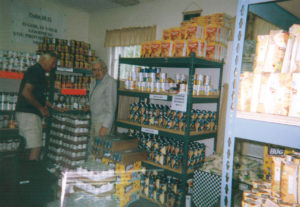

New Beginnings – Part 2 as I Explore the Spirituality of Hunger in America

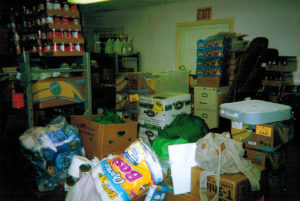
Like many first-time pantry volunteers everywhere, I showed up that morning because someone from the church asked me to come. A slot needed to be filled and I stepped up to the plate when I was asked. I was a foot soldier in the army of the outreach. I tried to live up to my status in the church as a new member. I showed up at whatever activity needed help and did my share. Nothing more.
I had no desire to move up any ladder in the congregation.
On that morning of new beginnings, I had no premonition I would ever return to this pantry room.
I had no plans for this place in my future. I had a profession teaching reflexology, Reiki, and canine massage therapy in a healing space in my home on Tannery Brook.
This was a case of fools rushing. Knowing what I know now, I should have run out the door and never looked back. Mary could have handled the crowd that day without me. In the whole two hours, no more than a couple dozen people visited the pantry.
I wasn’t blessed with any psychic knowledge…certainly not the feeling of danger I felt when I saw the head of the building committee in the hallway outside the pantry months later.
There were no lines in the hallway at the new beginnings of my time there. People wandered into the pantry in groups of one and two to choose from cereal, soup, tuna, and peanut butter.
Never in my wildest thoughts on that day did I envision the pantry hallway filled with hungry people, the tiny room packed with fresh produce and jammed with shoppers.
By 2008, the tanked economy was well underway and waits in the hallway were an hour or more.
The Hunger Prevention Nutrition Assistance Program (HPNAP) passed down feeding guidelines which included whole-grain bread, 1% milk, fresh produce. By 2011, the building committee had rules dictating where people could stand, what bathroom they could use, and what parts of the hallway were off-bounds.
Never did I foresee monthly food deliveries averaging over 12,000 pounds.
Never did I imagine, on that day, building committee members angry over hungry people receiving food according to guidelines set down by the State of New York, the Department of Health, and the United States Department of Agriculture.
I never thought I would spend months grappling with the unworthy hungry, a concept introduced to me by a local religious leader. The concept wasn’t explained. Only the two words – unworthy hungry – were used in a sentence: “You are feeding the unworthy hungry.” This was something I never heard of before. What did she mean? Who were the unworthy hungry?
After that first morning in the food pantry, I drove home, pulled out a little notebook from a drawer and wrote what people said, like real writers do. When I wrote these things down, I felt my grandmother’s presence.
Her spirit was with me in the room. I looked around the dining area to see if someone had entered the room without my realizing it. But, no, I didn’t find a soul. I walked over to a cabinet and began my dialogue journal on that afternoon.
A shopper: “They cut my food stamps again. I don’t know how I’m going to make it. I have no money this month. My car died and I don’t know where I’m going to get money to fix it. If I can’t fix it, I can’t buy a new one either.”
Lillie Dale Cox Thurman spoke to me clearly that morning with emphatic, strong, direct instructions. She went straight to my head: “Write this down! Write this down too! Now…write this down.”
My grandmother, Lillie Dale Cox Thurman, stepped into my life on the first morning in the food pantry and never left. Not even when my mother, Uralee Thurman Lawrence, roared in with prayers and fast, furious, aggressive instructions which I resisted to the bitter end. Under their directions, I joined the crowd in the basement and was soon volunteering regularly.
So, now, I’ve got the second volume, “The Ketchup Sandwich Chronicles,” coming out on this blog.
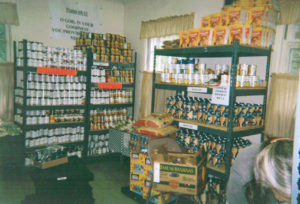
Thank you for reading this blogged book! Please refer it to your preferred social media network and stay tuned for future chapters!
Thurman Greco

Writing this Blog Post was Risky

Writing this blog post was risky. In the early days I worried about peoples’ opinions. I wrote my first blog entries with skeptics in mind. On some level it was important to me for pantry deniers to understand that there are, indeed, hungry people around us
One day I saw clearly that some people aren’t going to like me or my work. Nor are they going to believe what I write, no matter what I say. Once I realized that truth, I knew I’d been wasting energy on other people’s opinions.
I’m no longer interested in convincing anyone about what it means to go to bed hungry.
I’m okay with people saying anything about me because I know the chapters I write are true. The words I write make a difference in peoples’ lives.
This blog is about people creating better lives for themselves while not having enough to eat and lacking proper healthcare, housing.
This blog is about healing and creating new opportunities in one’s life. This blog is about people changing their lives – against all odds.
While I tell this story, I know some people won’t believe a word. It’s okay. I have my story and they have their story.
Food and sex and money are three words and issues more concerned with a person’s core beliefs, emotions, and spiritual attitudes than anything else.
These three words offer rules for everyone. We each have core beliefs around them with opinions about what is okay and what isn’t okay. We have attitudes about food, sex, and money based on what we were taught by family members and peers when we were children. We live our lives based on those experiences. Reduced to their lowest common denominator, these words – food, sex, and money – are the same. They touch core beliefs in ways going straight to the heart and soul.
The food pantry was all about food and money. The sex part was limited, but still there. Sex happened in the pantry hallway line when a shopper suffering with mental illness, a handsome young man who lived in another world, masturbated in the food line.
Our attitudes, opinions, feelings about feeding hungry people are or are not based on facts, statistics, or reality. Nor will facts, statistics, information, change attitudes.
Finally, we all have beliefs about who it’s okay to feed and who it’s not okay to feed. My beliefs are based on life experiences, facts, statistics. Their beliefs are based on the same. I may have taken classes, gone to therapy. And, they may have also.
Their reality about what is okay and my reality about what is okay differ.
In the food pantry hallway, we all looked at the same people and saw different things. This situation is proof positive we each create our own reality about hungry people. Nothing changes either reality. We each see hungry people through lenses shaped by separate life experiences. Hungry people don’t live in two realities.
As the lines got longer, we looked at people in the line. I saw hungry people and they didn’t. I interacted with people weekly who dumpster-dived to feed themselves as well as their children, parents, housemates. Occasionally I read articles about the ethics of dumpster diving. I didn’t think we could explore the ethics of allowing people go hungry because they couldn’t make enough money at their jobs to buy the food they needed to live and work.
People coming to a food pantry can take a three-day-supply of food home each week. The other four days, they’re on their own. That means they can buy more food if they have a SNAP card and if they can get to a store selling food. If they don’t have the money or a SNAP card, they get creative or go hungry. This involves panhandleing, borrowing money or food from friends, relatives, neighbors. They can steal, dumpster-dive, drop in at someone’s house at mealtime, and skip meals.
“Thurman is out of control over at the food pantry” described the local vicar because of the number of people shopping at the pantry and the amount of food they took home.
Thank you for reading this blog post. Please refer it to your favorite social media network.
Thurman Greco

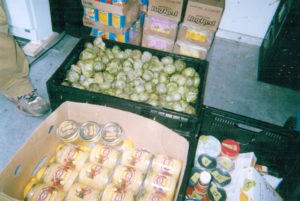
Are You Working On or Off?

A fairly common question I heard in the pantry line: “Are you working on or off?”
The first time I heard this question, I was confused. What did it mean? Actually, it referred to whether or not the person was paid in cash under the table or was paid money with withholding taken out.
Often the answer was something like: “I’ve got two days over at the food store and three days at Mrs. O……’s where I help her with her house and her office. I’m looking for a few more hours but it’s not happening.”
What this question asked was how many hours a person worked on the books and how many hours off the books. Not only was this practice illegal but it robbed workers of any benefit accrual and the opportunity to pay taxes.
Minimum wage paychecks simply don’t last a week. Individuals, families, entire households even can be employed and still live in poverty. My experience in the pantry was that more people in the pantry shopping line are employed than not.
I used to think of people as being employed or unemployed.
As I gained experience with the situation, I added another label: underemployed. So, rather than thinking in terms of employed or unemployed, I thought of hungry people in the line as being employed or underemployed.
I still see unemployed people but I realized many people aren’t paid a living wage.
I see shoppers where each person in the household works more than one job. The hope, dream, goal for many is simply to work enough hours and make enough money that a person can take a day off occasionally and have enough money to eat the following day.
People holding down more than one job often had trouble finding time to get to the Department of Social Services office to apply for SNAP (food stamps), although they might have qualified for the benefits.
Without a secure community safety net for the poor and destitute in our country, pantry volunteers needed to feed groceries weekly to families and households without money after they paid for rent and transportation to get to work.
Since the ’90s, many states have been “hell bent to Harry” to get people to work…no matter what. Welfare is no longer on the table.
A tip: Some people don’t realize our nation hasn’t offered much in the way of welfare in a long, long time. In polite conversation, I heard a statement: “That person shouldn’t be in your line. Her son has a job and she has a car.” I find it amazing that people in this country have been and continue to be comfortable denying assistance to the needy and destitute families while offering tax breaks to the wealthy.
My question was this: “How do people cope?”
Work first is not always a good option. I regularly saw pantry shoppers with family members who would be institutionalized if they weren’t being cared for by family. The institution is always the more expensive option.
The problem was that the family had nothing. So, while Helen or Sue or Fred was caring for the ill/disabled person, s/he wasn’t able to work.
Employment opportunities are a large part of the problem. People find themselves down and out in places with few job opportunities. Young people graduated from high school or college and can’t find a job anywhere.
Every economic downturn erases job opportunities. When the economy finally recovers, many jobs don’t return. Each recovery creates a class of citizens permanently living in the poverty of unemployment, underemployment, temporary employment, and day labor. Part time employment and being “on call” is a way of life.
The new group created after the downturn of 2008 had its own label: The Struggling Class.
Education costs are a factor. Fewer and fewer people can afford college or trade school. Some are afraid of the college loans they might not be able to pay off. One young woman in our food pantry line worked sixty hours weekly in low wage jobs to repay her college loan.
A fundamental attitude adjustment helped us realize food stamps, food pantries, soup kitchens, and shelters are no longer emergency concepts. They are the new way of life in the 21st century.
BEN
“I’m finished!” he blurted out. ” They fired me today!” I’ll never be able to get another job again. I’m too old!” Frightened reality covered his face when he entered the pantry for the first time. I didn’t say a word. I let him shout. He didn’t look or act as if he was going to hurt anyone and I felt he needed to release his anger.
I wanted his life to be easier than it was but what I wanted for him or any other shopper was nothing more than wishful thinking. There was little to nothing I could do. And, truthfully, I was helpless to do anything for him beyond offering a three-day-supply of food.
Every week after the first visit, he entered the pantry, shopped, and never made a sound. The mask of his face never changed.
Once the hair goes grey, it’s hard to compete in the market place. In a down economy, employers hire the younger applicants believing they’ll work harder for less money.
I hoped his unemployment would hold out until he could figure out how to get something more.
We all just left him alone. The pantry space was so small. It took him a year to calm down.
All we had was delicious, nutritious, food with a heavy emphasis on fresh vegetables and fruits. I relied on the food to make up for what we didn’t have.
I saw him recently – calm, maybe at peace with his situation. He lives in his truck, semi-homeless I suppose. He has places to bathe and sleep when he’s in Woodstock.
Woodstock attracts musicians. He’s one of those considered talented, this man. He’s found places to play around the area and he’s looking okay. What more can we all ask for anyway?
Thurman Greco
Thank you for reading this blog post. Please refer it to your favorite social media network.
Thurman
A new book is coming soon! Please be on the lookout for Miracles!
Thanks again!
I Need a Gun – “Ketchup Sandwich Chronicles” – Hunger is not a Disease

“How much is an application for a gun permit?” I was the only cotton topped little old lady in the line at the Golden Hill government office in Kingston.
The counter person, an overweight man in his fifties, could hardly contain his laughter as he handed me the gun permit application. “That’ll be $5.00 please, miss.”
After handing him the money, I started to walk away. Then, turning back to him, I said pleasantly, “Will you sell me three more applications, please? A couple of the girls in my senior yoga class asked me to get applications for them, too.”
Pulling out $15.00 more, I put the money on the counter. The man gave me three more gun applications and I walked away. I had no idea who was going to receive them and I didn’t attend any senior yoga class but I remembered the old “Alice’s Restaurant” song about three people doing something and being part of a movement.
Things in the pantry were negative and confrontational since the first day I drove up with fresh produce for the hungry people shopping in the pantry. In the beginning, I tried to hide things and overlook the situation. Frankly, I hoped the negativity would just go away. And, of course, I was mistaken. Situations like that don’t just evaporate. People don’t just change. And now, I was beginning to tire of the whole situation. I’d been living with fear for years and was feeling like it was time to try to fix things.
Maybe a gun will help, I thought.
When I got home, Barry was sitting on the sofa, surrounded by his cats, Fizzle and Carrots, as he read his latest thriller.
“Hi, honey. How’s your day going?” Without looking up, he took a few grapes from a large fruit filled bowl on a table by the sofa.
“Here’s the application for the gun permit I just got. I want you to teach me to shoot a gun.”
“What!?”
“You can do it. You didn’t spend all those years sneaking off to the CIA without knowing how to use a gun. They even gave you a medal or something. For all I know, you’re a damn bazooka expert. Maybe I want to learn that, too!”
“You can’t do that! You might shoot one of the Chihuahuas.”
“Well, I’m tired of asking pantry volunteers to be bodyguards. It’s not safe when I’m working after hours at the pantry. And, I’m not one bit afraid of the shoppers.”
“Listen, I know your job is difficult. Not even a Marine drill sergeant would do what you’re doing. But, I don’t know about a gun.”
“That Mag-Lite I bought a while back just isn’t what I need. A gun is more powerful and I’ve lived with them my whole life. My grandmother kept a rifle in her bathroom.”
“T.G. you’re just not the gun type. I’ll teach you to use a knife. A good knife won’t cost as much as a gun and you won’t need a permit. You won’t need to buy bullets. There’s nothing to clean unless you stab someone. It’ll be easier to use and carry. I’ll give you some lessons. Nobody will ever know. It’ll be our secret. Leash up the Chihuahuas. We’re going to Warren Cutlery in Rhineback.”
And so he did. He took me to Warren Cutlery where there was a generous selection of knives. We went into the knife room which included stock for kitchens as well as other knives not designed to slice and chop onions. I stood in front of the case. “Which knife are you interested in?” The clerk spoke to me as though showing weapons to a cotton topped old lady was the most boring thing he did all day. And, maybe it was.
“I’d like to see the one over there with the four-inch blade, please.” I held it in my hand and then asked to see several more on display in the case. Barry walked over to the case, stood beside me, and saw the knife I held in my hand.
“That knife is too big and too heavy.” he said, pointing to a smaller model. “You need something you can carry in your purse and you need something you can open rapidly. If you’re too slow, your attacker will have you down before you get it open.”
So, I chose a smaller, lighter model that happened to be on sale.
Barry paid the bill, and off we went.
He did just what he said he would. He taught me how to open a knife quickly but never bothered teaching me to close it.
And, he was correct. A knife is quiet. It weighs less than a gun. There’s no need for a permit. The Chihuahuas won’t get shot. And, unless I go through a metal detector before I take it out of my purse, no one has a clue.
Before it was over, he bought me a second knife which I kept open on the pantry counter next to the large Mag-Lite, ostensibly to open the cardboard boxes.
Thurman Greco
Woodstock, New York

Thank you for reading this story. It is, for now, the first chapter in “The Ketchup Sandwich Chronicles.”
Please share this post with your favorite social media network.
Winter Solstice Meditation – December 21, 2018

Find a quiet place where you can feel protected when you begin this Winter Solstice Meditation.
Calm yourself. Center yourself. Begin this Winter Solstice Meditation with a long, slow, breathing pattern as you breathe out negativity, problems, stress and breathe in peace, positive thoughts and beauty.
As you breathe in and breathe out for a few moments, you will become calmer and more grounded.
The Winter Solstice is a turning point of the year, a time of re-birth and a new beginning for all life on Planet Earth. This Winter Solstice turning point brings new energy.
May all life on Planet Earth use our new energy for peace.
May all life on Planet Earth use our new energy to know we are connected and to reclaim our awareness.
May all life on Planet Earth use our new energy to work together to deepen the understanding between every being and the natural world surrounding us.
May all life on Planet Earth use our new energy to foster mutual respect and work together focused on harmony.
May all life on Planet Earth be blessed with abundance and enough food.
May all life on Planet Earth be blessed with appropriate housing and be free from fear.
Sit quietly with this meditation and its energy for a few moments.
When you are ready to end this meditation, move your muscles gently as you return to your surroundings.
You may regain the energy of the re-birth of the Winter Solstice whenever you want.
Thank you for participating in this meditation.
Thurman Greco
Woodstock, New York

Please refer this article to your preferred social media network.
Please share this meditation with everyone you know.
Tom Pacheco Performs Peace Concert December 15th

Tom Pacheco, a local and extraordinary songwriter and singer/guitarist will perform his annual December Peace Concert along with Brian Hollander at 8:00 pm on Saturday, December 15th at the Rosendale Café, 434 Main Street, Rosendale.
Tom Pacheco is a much loved performer who writes poetically beautiful songs. He tells stories of life in a penetrating style which sends a message about fighting for the truth. He and Brian Hollander have played together many times at concerts in the area.
Tom Pacheco is also a personal hero of mine. His support of the food pantry as we served hungry people went beyond words. On two separate occasions, Tom Pacheco played concerts with all proceeds going to feed hungry people.
The Rosendale Café doesn’t take reservations but serves fine vegetarian food. For more information, see rosendalecafe.com or call 845-658-9048.

Tom has his own chapter in this book because of the work he did to bring food to the pantry to feed the hungry.
Thank you for reading this article. Please refer it to your favorite social media network.
Please tell all your friends, relatives, neighbors about this concert.
Thank you
Thurman Greco
Woodstock, New York
A Food Pantry Thanksgiving Day Blessing of Opportunity

I offer blessings for the volunteers in the food pantry and for everyone I see shopping each week.
The food available in the pantry reminds me that we all live in the abundance of this time and place.
I am thankful for the clothes on my back, for my health.
And, I’m thankful for the opportunity to celebrate this historic day with people of all languages and faiths.
I’m honored to live in this great country whose landscape is vast and whose population come from the world over.
This Thanksgiving Day is a time to welcome the coming new year with thoughts and prayers of hope and new beginnings for the coming year.
May the energy of this special day gather new energy for peace.
Finally, I’m grateful to be here, to be connected to this pantry. I appreciate the support I’ve received from the people I’ve come to know here.
I look forward to the blessings which I feel will be coming my way in the future.
I’m hopeful about the opportunities I see coming my way in the near future as 2019 becomes a reality.
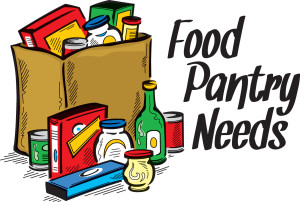
Thank you for reading this article. Please refer it to your preferred social media network.
Thurman Greco
Woodstock
10 Things You Can Do For Hungry People Now
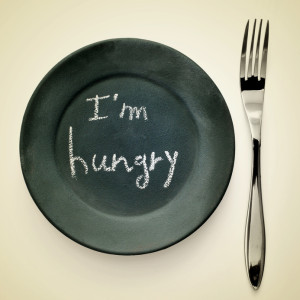
DONATE FOOD TO A FOOD PANTRY
When you purchase groceries, buy a few extra jars or cans of food and take them to your neighborhood food pantry.
Peanut butter is my favorite choice. It’s shelf stable so needs no refrigeration. That makes it good for homeless people. It doesn’t spoil quickly so it can be used by a household with one or ten people. It doesn’t require a lot of chewing so it’s good for a person with no teeth. In short, peanut butter is a perfect food choice for a food pantry.
However, if you would rather choose another item, go with whatever you want to give. Whatever you choose, it will be selected by someone shopping in the pantry.
CLEAN OUT YOUR KITCHEN CABINETS
Give the unused items to your local food pantry.
HOST A FOOD DRIVE
Invite your friends and neighbors to help you collect food for your local food pantry.
DONATE CLEAN EGG CARTONS AND REUSABLE SHOPPING BAGS TO YOUR FOOD PANTRY.
Food pantries are always in need of shopping bags and egg cartons. Eggs coming to a food pantry usually come in cases – without the cartons.
Shopping bags are not usually found on food pantry shopping lists.
CLEAN OUT THAT CLOSET!
Take your gently used clothing and bedding to a pantry or soup kitchen for distribution. I recently learned that the clothing item most needed in shelters is socks.
I also learned that women’s shelters are always in need of bras.
In the Albany, New York, area, you can send gently used or new women’s bras to:
YWCA – Greater Capitol Region
Brava
21 First Street
Troy, New York 12180
CELEBRATE YOUR BIRTHDAY.
Invite people to a party and ask them to give donations to a food pantry instead of a gift.
GIVE A LITTLE THROUGHOUT THE YEAR.
Make a regular donation to a food pantry. This translates to sending a check or gas card every month or quarter.
CONTACT ELECTED OFFICIALS AND PERSONS OF INFLUENCE.
Motivate them to make ending hunger and homelessness a priority. Encourage them to support fair wages and benefits for workers.
READ A BOOK.
“Take This Bread” by Sara Miles, “Under the Overpass” by Mike Yankoski, “I am Your Neighbor” by David R. Brown and Roger Wright, and “I Don’t Hang Out in Churches Anymore” by Thurman Greco are four books which tell revealing stories about hungry people in America.
START A SCHOOL BACKPACK PROGRAM.
Backpack programs send food home on Friday afternoons to households where children would not otherwise eat over the weekend without the donated foods.
Thanks for reading this article! Please refer it to your preferred social media network.
Thurman Greco
Woodstock

.




